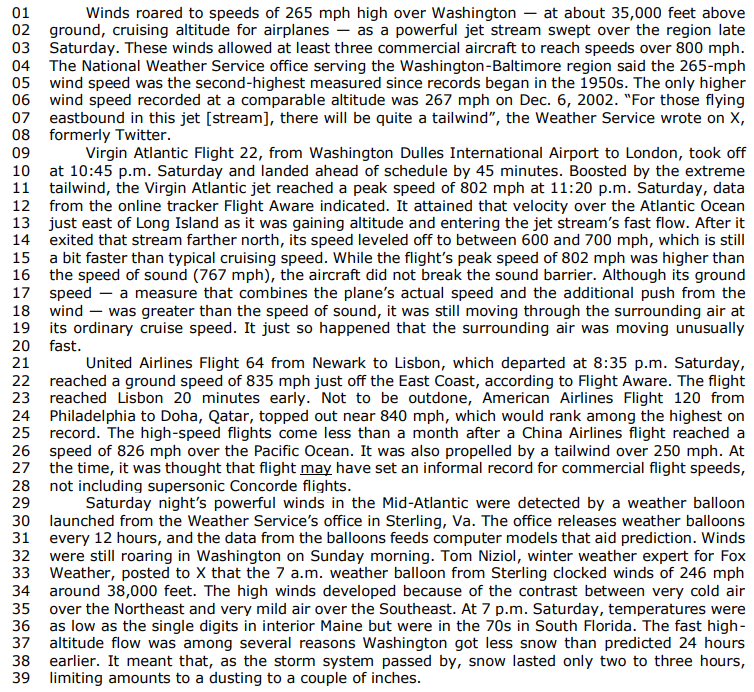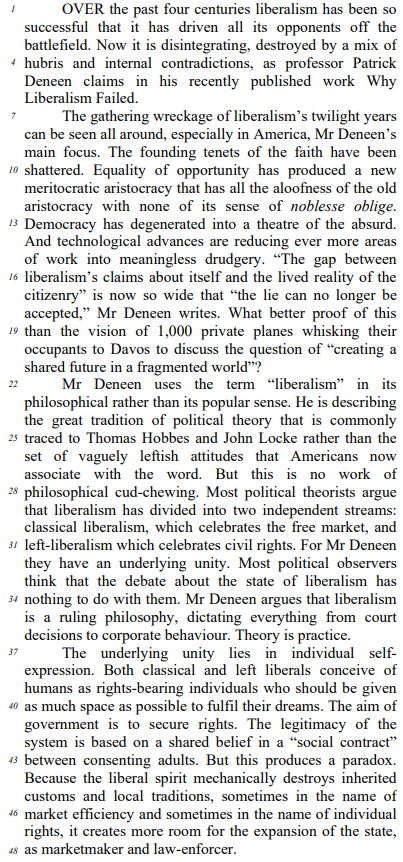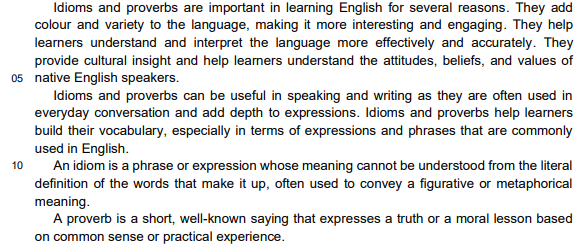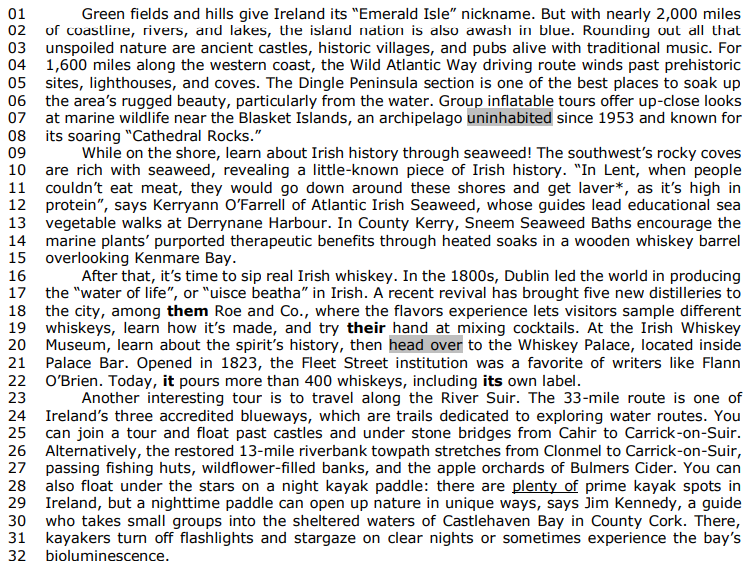Questões de Concurso
Sobre sinônimos | synonyms em inglês
Foram encontradas 1.298 questões
Read Text I and answer the fourteen questions that follow it
Text I The “literacy turn” in education: reexamining
what it means to be literate
In response to the phenomena of mass migration and the emergence of digital communications media that defined the last decade of the 20th century, the New London Group (NLG) called for a broader view of literacy and literacy teaching in its 1996 manifesto, A Pedagogy of Multiliteracies: Designing Social Futures. The group argued that literacy pedagogy in education must (1) reflect the increasing cultural and linguistic diversity of the contemporary globalized world, and (2) account for the new kinds of texts and textual engagement that have emerged in the wake of new information and multimedia technologies. In order to better capture the plurality of discourses, languages, and media, they proposed the term ‘multiliteracies’.
Within the NLG’s pedagogy of multiliteracies, language and
other modes of communication are viewed as dynamic resources
for meaning making that undergo constant changes in the
dynamics of language use as learners attempt to achieve their
own purposes. Within this broader view of literacy and literacy
teaching, learners are no longer “users as decoders of language”
but rather “designers of meaning.” Meaning is not viewed as
something that resides in texts; rather, deriving meaning is
considered an active and dynamic process in which learners
combine and creatively apply both linguistic and other semiotic
resources (e.g., visual, gesture, sound, etc.) with an awareness of
“the sets of conventions connected with semiotic activity [...] in a
given social space” (NLG, 1996, p. 74).
Grounded within the view that learning develops in social,
cultural, and material contexts as a result of collaborative
interactions, NLG argued that instantiating literacy-based
teaching in classrooms calls on the complex integration and
interaction of four pedagogical components that are neither
hierarchical nor linear and can at times overlap: situated practice,
overt instruction, critical framing, and transformed practice. […]
Although the NLG’s pedagogy of multiliteracies was
conceived as a “statement of general principle” (1996, p. 89) for
schools, the group’s call for educators to recognize the diversity
and social situatedness of literacy has had a lasting impact on
foreign language (FL) teaching and learning. The reception of the
group’s work along with that of other scholars from critical
pedagogy appeared at a time when the field was becoming less
solidly anchored in theories of L2 acquisition and more interested
in the social practice of FL education itself. In the section that
follows, we describe the current state of FL literacy studies as it
has developed in recent years, before finally turning to some very
recent emerging trends that we are likely to see develop going
forward.
(Adapted from: https://www.colorado.edu/center/altec/sites/default/files/ attachedfiles/moving_toward_multiliteracies_in_foreign_language_teaching.pdf)
Planes top 800 mph as near-record winds sweep high over Mid-Atlantic

(Available at: www.washingtonpost.com/weather/2024/02/18/record-jet-stream-winds-dc-flights/ – text
specially adapted for this test)

The word can in “I can write this letter if you need” expresses:
British troops move black rhinos to Malawi
British troops have helped to move a group of critically endangered black rhinos from South Africa to Malawi to protect them against poaching. Soldiers from the 2nd Battalion Royal Gurkha Rifles moved 17 of the animals, which are hunted for their horns, in the hope they can be better protected. They were transported by air and road from KwaZulu-Natal in South Africa to Liwonde National Park in Malawi.
The troops then spent three months training rangers to keep them safe. Major Jez England, the officer commanding the British Army counter-poaching team in Liwonde, said the operation had been “hugely successful”. “Not only do we share skills with the rangers, improving their efficiency and ability to patrol larger areas, but it also provides a unique opportunity for our soldiers to train in a challenging environment”, he said.
The UK government says it has committed more than £36m to tackle the illegal wildlife trade between 2014 and 2021. Part of this is to help support trans-boundary work to allow animals to move more safely between areas and across national borders.
(Site: BBC - adaptado.)
The synonym of “work” is NOT:
U.S. Thaws Relations With “Europe’s Last Dictatorship”
As ties between the West and Russia wallow at the worst point since the end of the Cold War, the Trump administration has been forging closer ties with one of the last countries fully in Moscow’s orbit. President Donald Trump’s then-national security advisor, John Bolton, visited Belarus earlier this year, and U.S. officials say Secretary of State Mike Pompeo is expected to follow suit and travel to Minsk in January. Belarus, which has been referred to as “Europe’s last dictatorship,” expelled the U.S. ambassador in 2008 after Washington slapped sanctions on it over human rights abuses. But now, the United States is expected to revive diplomatic ties with Belarus—sending an ambassador to Minsk for the first time in over a decade—even as Russian President Vladimir Putin tries to subdue it.
https://foreignpolicy.com/2019/12/25/10-important... - adaptado
A synonym for “ties” in the context of the text is:
Read the text below and answer questions 35 to 40
- A new study from archaeologists at University of Sydney and Simon
- Fraser University in Vancouver, has provided important new evidence
- to answer the question "Who exactly were the Anglo‐Saxons?" New
- findings based on studying skeletal remains clearly indicate the Anglo‐
- Saxons were a melting pot of people from both migrant and local
- cultural groups and not one homogenous group from Western Europe.
- Professor Keith Dobney said the team’s results indicate that "the
- Anglo‐Saxon kingdoms of early Medieval Britain were strikingly similar
- to contemporary Britain ‐‐ full of people of different ancestries sharing
- a common language and culture." The collaborative study looked at the
- three‐dimensional shape of the base of the skull. "Baased on this, we
- collected 3D data from suitably dated skeletal collections from Britain
- and Denmark, and then analysed the data to estimate the ancestry of
- the Anglo‐Saxon individuals in the sample."
- The researchers found that between two‐thirds and three‐quarters of
- early Anglo‐Saxon individuals were of continental European ancestry,
- while between a quarter and one‐third were of local ancestry. When
- they looked at skeletons dated to the Middle Anglo‐Saxon period
- (several hundred years after the original migrants arrived), they found
- that 50 to 70 percent of the individuals were of local ancestry, while
- 30 to 50 percent were of continental European ancestry, which
- probably indicates a change in the rate of migration and/or local
- adoption of culture over time. "These findings tell us that being Anglo‐
- Saxon was more likely a matter of language and culture, not genetics."
- Although Anglo‐Saxon origins can clearly be traced to a migration of
- Germanic‐speaking people from mainland Europe between the 5th
- and 7th centuries AD, the number of individuals who settled in Britain
- is still contested, as is the nature of their relationship with the pre-
- existing inhabitants of the British Isles, who were Romano‐Celts.
- The ongoing and unresolved argument is whether hordes of European
- invaders largely replaced the existing Romano‐British inhabitants, or
- did smaller numbers of migrants settle and interact with the locals,
- who then rapidly adopted the new language and culture of the Anglo‐
- Saxons? "The reason for the ongoing confusion is the apparent
- contradiction between early historical texts (written sometime after
- the events that imply that the newcomers were both numerous and
- replaced the Romano‐British population) and some recent
- biomolecular markers directly recovered from Anglo‐Saxon skeletons
- that appears to suggest numbers of immigrants were few," said
- Professor Dobney. "Our new data sits at the interface of this debate
- and implies that early Anglo‐Saxon society was a mix of both
- newcomers and immigrants and, instead of wholesale population
- replacement, a process of acculturation resulted in Anglo‐Saxon
- language and culture being adopted wholesale by the local
- population." "It could be this new cultural package was attractive,
- filling a vacuum left at the end of the Roman occupation of Britain.
- Whatever the reason, it lit the fuse for the English nation we have today
- ‐‐ still comprised of people of different origins who share the same
- language," Professor Dobney said.
Adapted from article available at:
https://www.sciencedaily.com/releases/2021/06/210623144901.htm
Accessed on: July 13, 2021.
The words “Although” (l. 25) and “whether” (l. 30) could be replaced, with little or no change of meaning or structure, by the words:
Keeping in mind the ideas expressed above and the linguistic aspects of the text, judge the following item.
The phrase “short for massive open online courses” (in the
last sentence of the first paragraph) can be correctly replaced
with which stands for massive open online courses.
Giving Blood = Giving Life
Giving blood is an amazing thing a person can do. Why? Because people who have anaemia, cancer, blood disorders, sickle cell, and other illnesses need blood transfusion. Some people even need regular blood transfusion to live.
Think about it: giving blood as part ............ everyone’s life; something they done .............. a regular basis, like eating ........... a favourite restaurant. What kind of difference does that make? Well, a donation might make the difference between life and death for nearly five million people who receive blood transfusions every year.
Giving blood is simple and convenient. It only takes about an hour and you can make the donation at a donor center. Afterwards, you will feel good about yourself.
Most people don’t think they’ll never need a blood transfusion, but many do. Blood is something money can’t buy. One may give a newborn, a child, a mother or a father, a brother, or a sister another chance at life. In fact, this simple action may help to save lives.
The blood donation process is much quicker and easier than you think. Giving blood will not decrease your strength and it’s certainly the right thing to do.
The word decrease (last paragraph), has its synonym in which alternative?
Mark the alternative that does have a synonym for the word "stuck".
TEXTO 01
O texto seguinte servirá de base para responder às questões de 01 a 08.
HEALTH CHECK
TAKE THIS CANCER QUIZ TO DETERMINE YOUR RISK OF DEVELOPING DISEASE - AS 1 IN 2 FACE DIAGNOSIS
(1º§) Around one in three cases of the most common cancers could be prevented by eating a healthy diet, keeping to a healthy weight and being more active, according to Macmillan Cancer Support.
(2º§) The following factors are asked about in the quiz.
Smoking
(3º§) At the top of the risk factor list, the WCRF says "not smoking is the best way to protect yourself from cancer".
Weight
(4º§) "Being a healthy weight is one of the most important ways ____ protect yourself against 12 types of cancer," the WCRF says. This includes bowel, kidney, womb and oesophagus cancer.
Exercise
(5º§) There is a reason exercise is encouraged - and not to just look fit.
(6º§) The WCRF says: "Being moderately active for at least 150 minutes or vigorously active for at least 75 minutes a week helps protect against three types of cancer. "Doing 45-60 minutes of moderate activity a day increases the benefit even more."
Fruit and veg
(7º§) You should aim to eat five portions of fruit and five of veg every day. "Fruit and vegetables can protect against cancers of the mouth and throat and digestive tract," WCRF says.
Wholegrains
(8º§) Wholegrain versions of carbohydrates not only help you keep a healthy weight, but have also been shown to reduce the risk of bowel cancer, the WCRF says. Generally it's important to eat a balanced diet as a way to prevent cancer.
Sugary drinks
(9º§) How many sugary drinks do you drink a week? This includes fizzy drinks, sugar-sweetened tea and coffee and squash. "Limiting sugar-sweetened drinks helps to prevent weight gain, which reduces your cancer risk," the WCRF says.
High fat and sugar foods
(10º§) Similarly to sugary drinks, consuming too much junk food will lead to weight gain - and weight gain is an independent cancer risk factor.
(11º§) It doesn't mean you can never have your favourite chocolate bar, cake or crisps. But it's about simple daily swaps. The WCRF suggests swapping a whole chocolate bar for a small piece of chocolate and a piece of fruit, for example.
Red and processed meats
(12º§) A diet abundant in red meat, like beef, lamb and pork, should be avoided. Similarly processed meats, such as bacon, sausages and ham, shouldn't be consumed ____ much. Both are linked to bowel cancer risk.
(13º§) "Limiting your intake [of red meat] to no more than three portions a week (350-500g cooked weight) can protect against bowel cancer," the WCRF says.
Alcohol
(14º§) The best way to avoid this risk would be to stop drinking at all.
(15º§) But if you do like a tipple, stick to the guidelines of no more than 14 units a week - equivalent to around four to five pints of beer or large glasses of wine.
Sun exposure
(16º§) Do you go the extra measure to protect yourself ____ the sun?
(17º§) We're talking suncream used regularly, avoiding the sun between 11am and 3pm, wearing a hat and sunglasses and avoiding sunbeds. "By not using sun beds and protecting yourself from sun exposure, you'll reduce your risk of skin cancers," the WCRF says.
https://www.thesun.co.uk/health/15912985/cancer-quiz-determine-risk/
Mark the alternative that does NOT have a synonym to the word "swapping" (11º§).
Text to answer the question.

In: Political thought: the problem with liberalism.
The Economist, Edição impressa, p. 74, 27 jan. 2018.
“Wreckage” (line 7) is synonymous with “speed”.
Leia o texto a seguir e responda as questões de 30 a 40:
We crowded round, and over Miss Cathy's head I had a peep at a dirty, ragged, black-haired child; big enough both to walk and talk: indeed, its face looked older than Catherine's; yet when it was set on its feet, it only stared round, and repeated over and over again some gibberish that nobody could understand. I was frightened, and Mrs. Earnshaw was ready to fling it out of doors: she did fly up, asking how he could fashion to bring that gipsy brat into the house, when they had their own bairns to feed and fend for? What he meant to do with it, and whether he were mad? The master tried to explain the matter; but he was really half dead with fatigue, and all that I could make out, amongst her scolding, was a tale of his seeing it starving, and houseless, and as good as dumb, in the streets of Liverpool, where he picked it up and inquired for its owner. Not a soul knew to whom it belonged, he said; and his money and time being both limited, he thought it better to take it home with him at once, than run into vain expenses there: because he was determined he would not leave it as he found it. Well, the conclusion was, that my mistress grumbled herself calm; and Mr. Earnshaw told me to wash it, and give it clean things, and let it sleep with the children.
Hindley and Cathy contented themselves with looking and listening till peace was restored: then, both began searching their father's pockets for the presents he had promised them. The former was a boy of fourteen, but when he drew out what had been a fiddle, crushed to morsels in the great-coat, he blubbered aloud; and Cathy, when she learned the master had lost her whip in attending on the stranger, showed her humour by grinning and spitting at the stupid little thing; earning for her pains a sound blow from her father, to teach her cleaner manners. They entirely refused to have it in bed with them, or even in their room; and I had no more sense, so I put it on the landing of the stairs, hoping it might he gone on the morrow. By chance, or else attracted by hearing his voice, it crept to Mr. Earnshaw's door, and there he found it on quitting his chamber. Inquiries were made as to how it got there; I was obliged to confess, and in recompense for my cowardice and inhumanity was sent out of the house.
BRONTE, Emily. Wuthering Heights. London: Thomas Cautley Newby, 1847
“and his money and time being both limited, he thought it better to take it home with him at once, than run into vain expenses there”
A expressão destacada no fragmento acima, tem o significado de:
Leia o texto a seguir e responda às questões 51, 52 e 53.
Romance and Reality
Military service is demanding and dangerous. As I write this, American soldiers serve in remote and hostile environments. For young leaders in today's Army, the war on terror constitutes a difficult and sometimes tragic reality.
Meanwhile, in the small classrooms of West Point, young cadets consider war through the eyes of Rudyard Kipling, Carl Sandburg, and John McCrae. During his or her plebe year, every West Point cadet takes a semester of English literature, reading and discussing poetry from Ovid to Owen, Spenser to Springsteen. Cadets must also recite poems from memory, a challenge that many graduates recall years later as one of their toughest hurdles.
Why, in an age of increasingly technical and complex warfare, would America's future combat leaders spend sixteen weeks studying the likes of irony, rhyme, and meter?
Poetry confronts cadets with new ideas that challenge their worldview. The West Point curriculum includes poetry, history, philosophy, politics, and law, because these subjects provide a universe of new ideas, different perspectives, competing values and conflicting emotions. In combat, our graduates face similar challenges: whether to fire at a sniper hiding in a mosque, or how to negotiate agreements between competing tribal leaders. Schoolbook solutions to these problems do not exist; combat leaders must rely on their own morality, their own creativity, their own convictions. In teaching cadets poetry, we teach them not what to think, but how to think.
Adapted from https://www.poetryfoundation.org/search?query=romance+and+reality.
Choose the words that correctly and respectively substitute meanwhile and hurdles (paragraph 2).
Leia o texto a seguir e responda às questões 45, 46 e 47.
(Título omitido propositadamente)
Often when mentoring, in a one-to-one session, it will be clear that the mentee’s worst critic is the one they see very regularly – daily, in fact. Often when they are tired and stressed. Often when they are at a low point. It’s the one they look (1)________ the mirror.
I mean most of the time, the worst critic lives inside people’s head. It might be the criticism that you heard at school or college. It might be the voice of so-called friends. It might be a parent or guardian, sibling or perfect cousin. You can’t always shut those voices up. No matter how much you want to. You can, however, recognise that they are internal voices and cultivate a strategy to counteract them.
If you can have an internal critic, you can also have an internal cheerleader. One technique is to give yourself advice that you would give your best friend in that situation. If you’re worrying about not being good (2)________ something, what would you say to your best friend in that state? You’d probably tell them that it would be alright, they’ll sail through it, that you believe (3)________ them. If you can do it for your best friend, you can do it for yourself.
Adapted from https://www.campaignlive.co.uk/article.
Choose the alternative that correctly substitutes counteract in the sentence “You can, however, recognise that they are internal voices and cultivate a strategy to counteract them.” (paragraph 2).
Text 03 – Idioms and proverbs

Things to do in Ireland

*laver: a type of seaweed / seaweed: alga marinha
(Available at: www.nationalgeographic.com/travel/article/10-best-things-to-do-ireland – text specially adapted
for this test).
